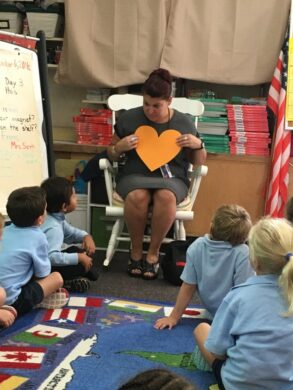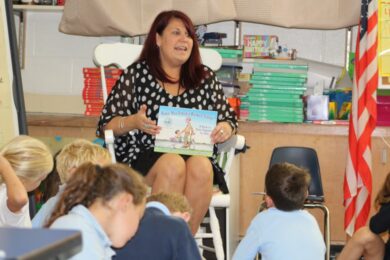As a new school year begins, it is important for students to know the role that adults play in their educational experience. Many students in grades 1-4 often don’t fully understand the role of the school counselor. Doing a “Meet the Counselor” activity during the first few weeks of school can help students better understand the role of a counselor and let them know these people are available to help students. During a recent visit to Mrs. Sem’s 1st grade class, a “Counselor’s First Aid Kit” was shared with students so they could better understand the role and responsibilities of a school counselor. Students were asked what they think about when they see a first aid kit, and they answered that a nurse or doctor carries a first aid kit to bandage cuts or give an ice pack to someone injured. It is explained that a school counselor also has a first aid kit in order to help students with the invisible hurt that is sometimes felt from interactions with other children and adults.
Items in the Counselor’s First Aid Kit are shown to students one at a time. As items are shown to students, they are asked, “What is this item, and what is it normally used for?” Students are also asked, “How does this item relate to what a school counselor does?” Once students answer, each item is explained including:

Heart: Counselor loves and cares about all students.
Ears: Counselor listens to all students when they need to talk about their feelings or problems.
SHH! (sign): Counselor will keep secrets and tell no one about what we talk about (unless I think you are in danger).
Tissue: Counselor will help you dry your tears when you are feeling sad or overwhelmed and remind you that it is okay to cry and share feelings is healthy and helps us heal! Everyone cries, even adults.
Band-Aid/Bandage: Counselor can help heal your wounds (the invisible ones that are deep inside of us) and make you feel better.
Eraser: Everyone makes mistakes and the counselor can help us deal with feelings when we make mistakes; and help us learn how to not make the same mistake again in the future!
The lesson concludes with a reading of the story Alexander and the Terrible, Horrible, No Good, Very Bad Day, by Judith Viorst. Students learn that everyone can sometimes have bad  days, and it is often helpful to talk to someone who can help us share our feelings and feel better. Alexander’s description of his terrible, horrible, no good, very bad day is a great example of a time in which students may want to seek the counselor’s help, guidance, and support. Counselors can help turn Alexander’s day into a great, excellent, good, and amazing one!
days, and it is often helpful to talk to someone who can help us share our feelings and feel better. Alexander’s description of his terrible, horrible, no good, very bad day is a great example of a time in which students may want to seek the counselor’s help, guidance, and support. Counselors can help turn Alexander’s day into a great, excellent, good, and amazing one!
Janelle Dumas
Guidance Counselor
